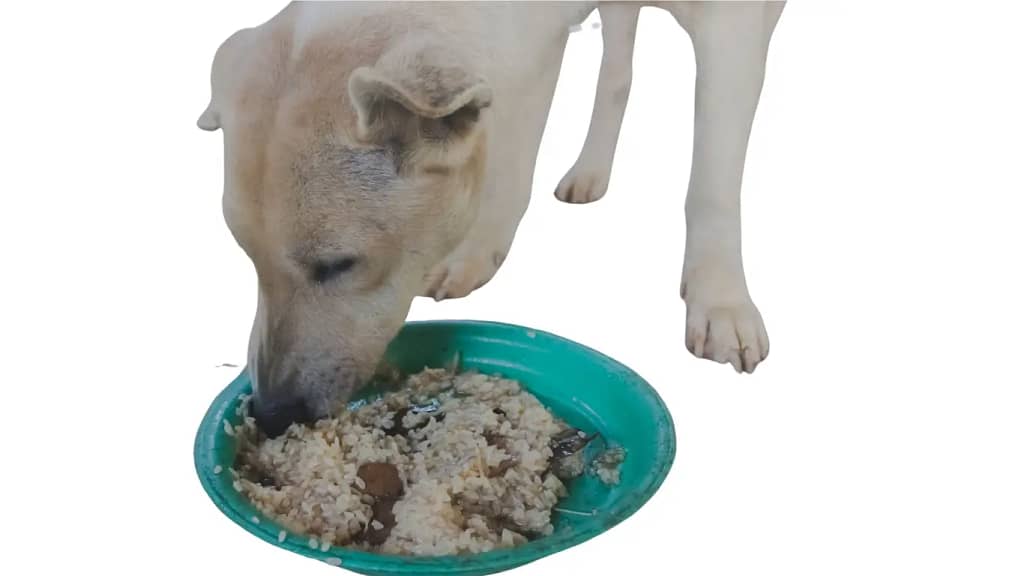Rice is a common staple in many households, and it’s natural to wonder if our dog can also enjoy this versatile grain. While dogs can eat rice, it’s important to understand the benefits and considerations of including rice in their daily diet. In this complete guide,
we will explore the topic of feeding rice to dogs, answering questions such as: Can dogs eat rice every day? Is rice good for dogs with diarrhea? For my dog, what can I mix with rice? Is it okay to feed my dog rice and chicken every day? Let’s dive into the details!

Table of Contents
ToggleA Guide To Understanding The Nutritional Value Of Rice For Dogs
Rice, whether white or brown, offers some nutritional benefits for dogs. It is a good source of carbohydrates, providing energy for their daily activities. Additionally, rice contains important minerals such as magnesium, phosphorus, manganese, selenium, and iron. It also provides vitamins like vitamin B, folic acid, thiamin, and niacin. These nutrients contribute to the overall well-being of dogs and support their bodily functions.
Can Dogs Eat Rice Every Day?
While dogs can eat rice, feeding them only a few times a week is recommended. Dogs require a balanced diet to meet all their nutritional needs. Rice should be considered a complementary addition to their regular meals. Please consult your veterinarian to determine the appropriate quantity of rice for your dog’s diet based on their specific needs.
Benefits of Rice for Dogs
1. Digestive Health Support
Rice, especially white rice, is often recommended by veterinarians as a bland food option for dogs with digestive issues such as diarrhea. Its bland nature can help soothe the stomach and slow stool production, relieving gastrointestinal upset. The easily digestible carbohydrates and fiber present in rice can aid in regulating bowel movements and maintaining digestive health.
2. Energy Boost
The carbohydrates in rice serve as a source of energy for dogs. That is particularly beneficial for active dogs that require an extra burst of energy during physical activities. Including a small portion of rice can give them the fuel to stay active and engaged.
3. Nutrient Contribution
Rice contains essential minerals and vitamins contributing to a dog’s health. The presence of minerals like magnesium, phosphorus, manganese, selenium, and iron supports proper body functioning and helps maintain healthy bones, teeth, and blood cells. Vitamins such as vitamin B, folic acid, thiamin, and niacin are crucial for metabolic processes and overall well-being.
Types Of Rice And Their Suitability For Dogs
1. White Rice
White rice, both long-grain and short-grain varieties, can be safely consumed by dogs. While it is lower in nutritional value than brown rice, it can still be a part of a balanced diet for dogs. However, due to its higher glycemic index, caution should be exercised when feeding white rice to dogs with diabetes or obesity.
2. Brown Rice
Brown rice retains the seed’s outer layer, the bran, which contains additional nutrients compared to white rice. It is higher in fiber, manganese, and B vitamins such as niacin. However, brown rice bran may make it harder for dogs to digest. It is often recommended for dogs without gastrointestinal issues.
3. Basmati Rice
A dog’s diet can include Basmati rice, both white and brown. As with other types of rice, moderation is key. Basmati rice is often suggested as a bland meal option for dogs with upset stomachs. However, ensuring the rice is plain and cooked without added salt or seasonings is important.
Mixing Rice With Other Ingredients For Dogs
Rice can be combined with other ingredients to enhance its nutritional value and add variety to your dog’s meals. When mixing rice with other foods, it is crucial to ensure that the ingredients are safe and suitable for dogs. Here are some options to consider:
1. Rice and Chicken
Rice and chicken are a common combination for dogs, especially when they have digestive issues. Boiled boneless, skinless chicken can be added to plain cooked rice to create a balanced meal. It is important to remove any excess fat or seasoning from the chicken before serving it to your dog.
2. Rice and Vegetables
Adding cooked vegetables to rice can further enhance its nutritional value. Vegetables such as carrots, peas, green beans, and pumpkin can provide additional vitamins, minerals, and fiber to your dog’s diet. Ensuring the vegetables are cooked thoroughly and cut into small, easily digestible pieces is important.
3. Rice and Fish
Fish can be a healthy addition to rice meals for dogs. It is a good source of protein and essential fatty acids. Choosing boneless and cooked fish is important when incorporating fish into your dog’s diet. Avoid using fish that is high in mercury, such as tuna.
Feeding Rice To Dogs With Diarrhea
Rice is commonly recommended as a bland diet for dogs experiencing diarrhea. The blandness of rice helps soothe the stomach and slow down bowel movements. When feeding rice to dogs with diarrhea, it is important to follow these guidelines:
- Cook plain white rice without any additives or seasonings. Avoid using butter or oil.
- Serve small portions of rice alongside a lean protein source such as boiled chicken or turkey.
- Feed multiple small meals daily to aid digestion and prevent stomach overload.
- Gradually reintroduce your dog’s regular diet once their stool firms up and their digestive system stabilizes.
Remember, it is always important to consult with your veterinarian before making any dietary changes or feeding your dog a special diet, especially if they have specific health conditions or are on prescription diets.
Factors to consider and risks to avoid
While rice can be beneficial for dogs, it is important to consider the following points:
1. Moderation is Key
Rice should be fed to dogs in moderation. Treats and snacks, including rice, should only make up a small portion of their diet. Most of their nutrition should come from a well-balanced and complete dog food diet formulated to meet their nutritional needs.
2. Individual Considerations
Each dog is unique, and their dietary needs may vary based on age, breed, size, activity level, and overall health. It is crucial to consider these individual factors when determining the appropriate amount of rice to include in their diet.
3. Obesity and Diabetes
Rice, especially white rice, has a higher glycemic index and can cause a rapid increase in blood sugar levels. It can be a concern for dogs with obesity or diabetes. If your dog has diabetes or struggles with weight management, working closely with your veterinarian to develop a suitable diet plan is essential.
4. Arsenic Contamination
Rice, especially certain types, may contain traces of arsenic due to environmental factors. Arsenic is a toxic substance that can have adverse health effects when consumed over a long period. It is important to source rice from reputable brands and take precautions to minimize arsenic exposure.
Conclusion
In conclusion, dogs can eat rice as part of a balanced diet. Rice can provide energy, aid in digestive health, and offer essential nutrients for dogs. However, it is crucial to feed rice in moderation and consider individual factors such as specific dietary needs, health conditions, and potential risks. If you are still deciding whether to include rice in your dog’s diet or have any concerns, it is always best to consult your veterinarian for personalized guidance. Remember, a well-balanced and complete dog food diet should form the foundation of their nutrition, with rice as a complementary addition.

